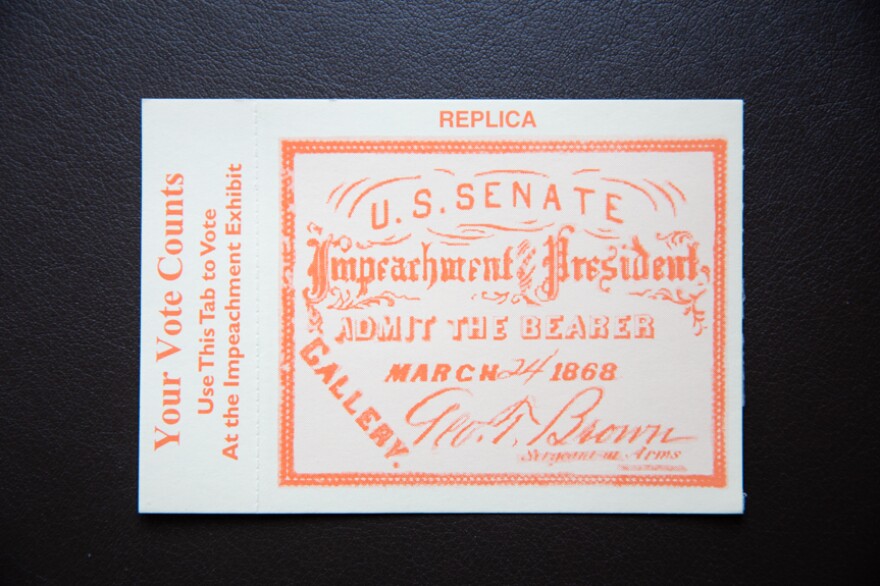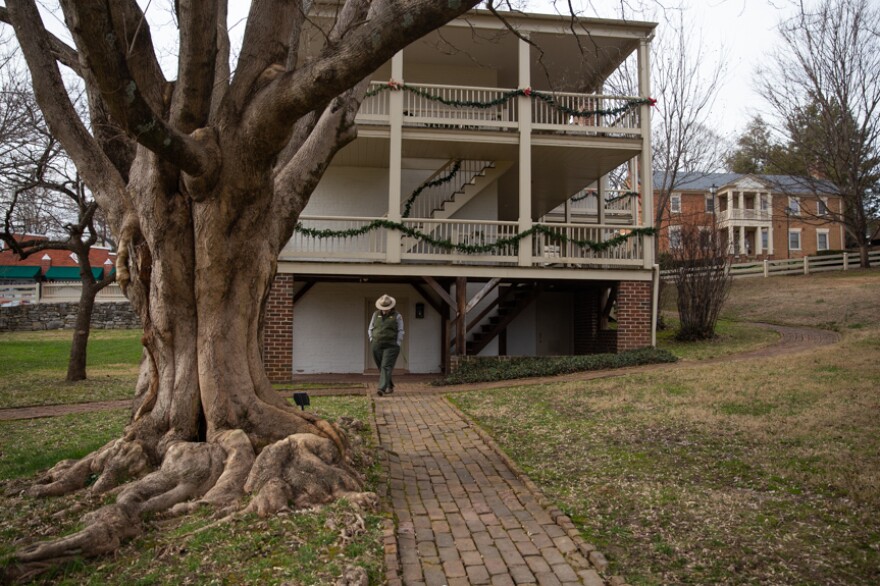The impeachment of President Trump has revived interest in the first president ever to be impeached over 150 years ago, Andrew Johnson.
In Greeneville, Tenn., the site where Johnson's former home is preserved has seen a recent surge in visitors, similar to a spike around the time that former President Bill Clinton was impeached in 1998.
"We do have a lot of people kind of veering off the highway when they see the brown sign because they recognize Andrew Johnson's name, and that he's the first president to be impeached. And they come on in to learn about why," says park ranger Emma Murphy.

Many people know little more about Johnson than that he took office after Abraham Lincoln was assassinated shortly after the Civil War ended and was later impeached. Few understand what led to Johnson's near removal from office, or the similarities between how the 17th president and the current president weathered the process.
Discord after the Civil War
A pro-Union Democrat, Johnson was chosen to run on a unity ticket with Lincoln, a Republican, in the 1864 election. After Lincoln's death thrust Johnson into the presidency, he began to pardon Confederates and push for letting states that had seceded back in the Union without any real consequences.
Johnson also repeatedly blocked efforts from Congress to enfranchise and give basic rights to newly-freed slaves, which led to clashes with the Radical Republicans who were in power. Murphy points out that Johnson's actions led to another century and beyond of struggles for African-Americans.
"The nation that Johnson sets up is what lends itself into the Jim Crow era and leads for the next hundred years of what Johnson wanted, leads all the way into the civil rights movement," Murphy says.
Congressional Republicans eventually passed the Tenure of Office Act, which barred Johnson from removing Cabinet officials without congressional approval. They knew Johnson wanted to remove Lincoln's Secretary of War Edwin Stanton from his post, and they were essentially daring him to. Johnson did, and that action led to Congress quickly passing 11 articles of impeachment.
While most dealt with Johnson's actions in removing Stanton, one underscored just how deep the animus ran between the executive and legislative branches.
"So Article 10 is that Johnson brought 'disgrace, ridicule, hatred, contempt and reproach' to Congress," says Murphy.
Johnson would frequently rail against Congress, and he even went on speaking tours to drum up support. The raucous events were not unlike the rallies Trump holds today, where he also mocks and rebukes legislators who oppose him.
"[Johnson] would become vulgar, coarse, he would rant," said author Brenda Wineapple. "He would do so much ranting in public that people thought he must be drunk, and he wasn't."
Wineapple details the trial of Andrew Johnson in her book The Impeachers: The Trial of Andrew Johnson and the Dream of a Just Nation, which was released last year. She imagines that if Johnson were president today, he would handle impeachment a lot like Trump.
"Johnson would be on Twitter day and night. He would not sleep," Wineapple says. "Twitter would be his go to medium for expression and reaching the people that he believed loved him."
Is impeachment punishment enough?
Back in Greeneville, the vitriol many people felt for the president is captured in a very unique way. Practically every inch of his home was left covered with graffiti, most of it having been scrawled by Confederate squatters during the war. The markings are now mostly covered with wallpaper, but the park service has preserved a small section so visitors can see the slurs and name-calling.

"You're going to see funny jokes, games, professions of love, professions of hate," Murphy points out on the tour. "We're going to see him deemed a traitor and committing Treason, spelled T-R-E-E-S-O-N... very creative."
Other exhibits in the visitors center detail the battles with Congress that led to Johnson's impeachment. On a late December afternoon, Tiffany Owen is one visitor who decided to drop by the Andrew Johnson National Historic Site after seeing impeachment coverage on the news. She lives in West Palm Beach, Fla., now but was back home in Tennessee visiting family over the holidays.
"I find Johnson really interesting, and especially given the climate that we're in now, understanding what is happening in modern context in terms of historical context is really interesting," Owen says.
Visitors also get a replica impeachment trial ticket to cast a ballot on whether or not they would have voted in the Senate to remove Johnson from office. Ultimately, Johnson survived removal by just one vote; most visitors agree and cast their votes for "not guilty."

Owen sees parallels between the Johnson and Trump trials. She says they both deserved to be impeached by the House, but to her that was enough of a punishment in itself.
"Is it a strong enough offense that it rises to the level of removal? And in my opinion it's not," she says.
Locals largely feel the same way in this small town that's about an hour east of Knoxville. Greene County Historian Tim Massey says they're proud of Johnson, who worked his way up from being a local tailor to the White House. Massey says Johnson's conduct was driven by his strict interpretation and fealty for the Constitution — he was even buried with a copy of it resting under his head, even though it was the same document that made it possible for him to be the first president ever impeached.

"He's overshadowed because of that one blot that seems to permeate his record," Massey says.
And he also sees similarities between the Johnson and Trump impeachments, especially with the House approving articles of impeachment against Trump with no Republican votes and the current president all but certain to be acquitted by a GOP-controlled Senate.
"I think both have a lot more to do with politics than him actually committing a high crime or misdemeanor," Massey says. "And I think with the thing with the Trump trial, it seems to be strictly along political lines."
Every presidential impeachment spurs strong emotions. And to Murphy, the park ranger who is tasked with explaining the complexities of Johnson and his views on race especially, it's a challenge she's excited about given the collision of past and current events.
"Bring it. Let's talk about it. Let's talk about Andrew Johnson. Let's talk about this process," Murphy says with a smile.
Copyright 2023 NPR. To see more, visit https://www.npr.org.




